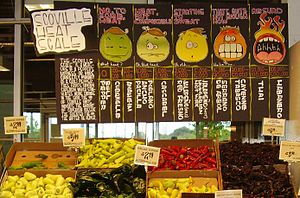
Pungency (/ˈpʌndʒənsi/ ) refers to the taste of food commonly referred to as spiciness, hotness or heat,[1][2][3] found in foods such as chili peppers. Highly pungent tastes may be experienced as unpleasant. The term piquancy (/ˈpiːkənsi/) is sometimes applied to foods with a lower degree of pungency[4] that are "agreeably stimulating to the palate". Examples of piquant food include mustard and curry. The primary substances responsible for pungent taste are capsaicin, piperine (in peppers) and allyl isothiocyanate (in radish, mustard and wasabi).
- ^ Tewksbury, J. J.; Reagan, K. M.; Machnicki, N. J.; Carlo, T. A.; Haak, D. C.; Penaloza, A. L. C.; Levey, D. J. (2008). "Evolutionary ecology of pungency in wild chilies". Proceedings of the National Academy of Sciences. 105 (33): 11808–11811. Bibcode:2008PNAS..10511808T. doi:10.1073/pnas.0802691105. PMC 2575311. PMID 18695236.
- ^ Cite error: The named reference
Institutewas invoked but never defined (see the help page). - ^ "Chile Heat" (PDF). Chile Pepper Institute, New Mexico State University. 2006. Archived from the original (PDF) on October 16, 2012. Retrieved September 14, 2012.
- ^ "Merriam-Webster Dictionary: "Piquant"". Merriam-webster.com. Archived from the original on November 15, 2022. Retrieved February 7, 2014.